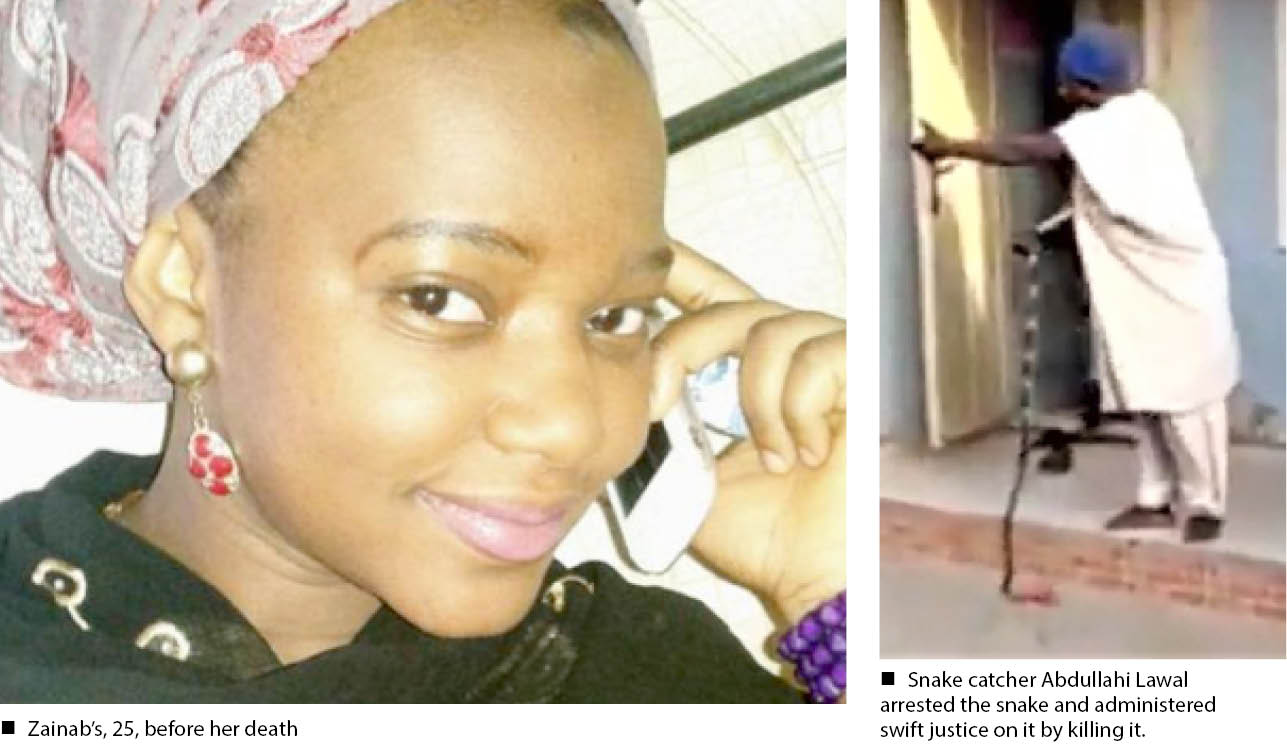• How pregnant mother of one died from snakebite over lack of antivenom
At the beginning of the year, Zainab Ahmad, 25, and eight-month pregnant, was looking forward to having her baby before her life was cut short by a snake attack in her toilet. Daily Trust traces the moment of the attack to her futile search for antivenom in Kaduna.
On Thursday January 2nd, when Zainab Ahmad, 25, woke up at her Kinkinau residence in Kaduna, her prevailing concern was probably the cold and the baby growing in her womb. She was due in about a month’s time. She had no idea that a visit to her own toilet and an encounter with a snake would lead to her death that very day.
When she called her husband, Ahmad Aliyu, at around 7am to report that a snake had bitten her in her toilet, he had his doubts.
“I asked her if she saw the snake, but she replied in the negative but was certain it was a snake because she had stepped on it,” Ahmad Aliyu, who was in Abuja at the time of the incident said. “At that time I was confused and did not know how to react. I was wondering how a snake could have entered the house because everywhere is interlocked and also there is a big cat in the house so I suggested to her that probably it was a scorpion.”
But it was certainly not a scorpion and that 7am call triggered a flurry of activities, panic, confusion and a mad dash to several Kaduna hospitals in search of treatment for the eight-month pregnant Zainab.
On the phone, Ahmad Aliyu asked if she was feeling dizzy, she said no. He called his first wife and a driver who lived nearby to help take Zainab to a hospital.
“After 15 minutes, I saw her missed call and when I called back, there was no reply,” he said. But that was not the last he would hear from his dying wife.
“She called back and told me she could not see clearly,” Ahmad said. “Then, she threw down the phone and I could hear her saying La illaha illa lah, [there is no god but Allah.] That was the last thing I heard her say. I called my first wife to take her to the hospital since they both stay in the same compound but the driver had not arrived.”
Khadija Ilyasu Ahmad, the first wife, was preparing her children for summer camp when she got the news of Zainab’s snakebite. She hurried to find the stricken woman in severe pains.
“When I got to her room, I found her siting and supplicating. She said that her throat was blocked and she could not breathe,” she said. She was at first confused but soon swung into action. “I gathered all the strength I have to take her into a car, and in less than five minutes, we arrived at Kinkinau Specialist Hospital. The door was locked so I knocked but I was told there was no doctor, the nurse called the doctor and asked him what medication to administer after explaining to him and he asked the nurse to give her lidocaine to reduce the pain.”
By this time, Zainab was in no condition to walk and there was no wheelchair in the hospital to help move her around, so Khadija asked another woman to help carry Zainab into the hospital. After she was injected, as per the doctor’s instructions, Khadija said Zainab became cold to the touch and it took five people to get her back in the car.
“At this point, the driver came and together we drove to Biba Hospital but we were told there was no doctor on duty. So we decided to go to 44 Army Reference Hospital, which we felt is in the best position to provide succour since it is a specialist hospital and well equipped,” she said.
At the barracks, the soldiers stopped the car for routine search but seeing Zainab’s condition, they let them through.
“When we entered the hospital, we did not know where to take her. Fortunately, a woman we met in the hospital advised us to take her to the maternity ward because the patient was pregnant,” she said.
But there, they discovered that the hospital had no antivenom and so they were referred to the Barau Dikko Specialist Hospital.
But Khadija decided in favour of taking Zainab to the Refinery Clinic in Chikun Local Government, where she was informed antivenom was available.
“The drive to the clinic should not be more than 30 minutes if the road was in good shape, but due to the bad nature of the road, it took us longer to get there. She was admitted by the nurses on duty and further check was done,” she said.
Finally, Khadija was called in and was informed by the doctor that neither Zainab nor the baby could be saved. About two hours after, after a marathon run to three different hospitals, it was all over for both Zainab and her unborn child.
The Culprit
Abdullahi Lawal, a snake catcher, was contacted to find the snake that had bitten Zainab. He packed his work tools and headed to the location.
“When I got to the house, I was led to the toilet. The whole place was sprayed with a special perfume then I flushed the toilet and when the perfume entered the closet, the snake came out and I caught it with my bare hands,” he said.
He added that the snake, which is locally called Bakaya, is rare in Africa and mostly brought into the country through goods containers. Mal. Lawal later killed the snake.
A senior consultant at the Abubakar Tafawa Balewa Teaching Hospital, Bauchi, Dr. Nura Alkali said when snake bite occurs, the best option is to ensure the snake is killed or identified. This would help the doctors know the right antivenom to administer on the patient because of the many venomous snakes in the world, and the different types of antivenom required for each case.
“Scientists have managed to class snake venom into three groups based on their effects on humans: Those that cause bleeding (mostly vipers); those causing paralysis (cobras) and those causing muscle damage and kidney failure (water-snakes). This classification is not absolute as some vipers also cause paralysis. Now, the only antidote to snake venom is snake anti-venom,” he said.
“SAV against one snake specie is ‘monovalent’. A mixture of two or more SAVs is ‘polyvalent’, which we use in Nigeria due to the variety of snakes here,” he said.
Without identifying the snake, he said, is because the polyvalent SAV may not be effective in subduing the venom of snakes that fall under monovalent SAV.
“This being Nigeria, it won’t surprise me too if some hospitals stock only monovalent SAV against WHO guidelines,” he said.
He also explained that time of death from the time of the snakebite varies from 30 minutes to as long as several days depending on the species of snake and the size of the human victim. Children are more prone due to their small body size and the amount of venom injected by the snake.
But with reference to Zainab’s case, the doctor said, “The lidocaine anaesthetic given to that unfortunate woman was only to kill pain but it had no effect on the venom. As I stated earlier, the only effective antidote to snake venom is snake anti-venom. There is no alternative, but in the absence of antivenom, those with mild ventilation may survive with supportive care, such as blood transfusion in those who are bleeding due to viper bites, use of tetanus toxoid to prevent tetanus, use of antibiotics in those with infected bite sites, may help. But those with severe ventilation are not likely to survive without anti-venom, he said.”
At Ahmad Aliyu’s residence, there is still shock and disbelief. The family has since taken to fixing broken soakaways and other places that may give any kind of creature access to the house. The loss of a mother and a baby is a severe blow for the family and the trauma of the attack will dwell with them for a while still.
For poor Zainab, a morning that started with such promise ended in tragedy that with the right treatment could have been avoided.

 Join Daily Trust WhatsApp Community For Quick Access To News and Happenings Around You.
Join Daily Trust WhatsApp Community For Quick Access To News and Happenings Around You.


